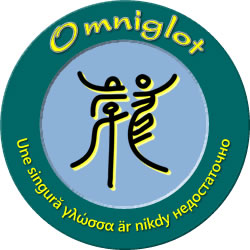
Language courses usually have lessons that explain how to talk about your job / profession / work. The examples they give might include jobs like doctor, nurse, teacher, secretary, engineer, architect, writer, ninja, etc. These are all mentioned in lessons I’ve done on Duolingo (and other apps).
If you tell someone you’re a teacher or a doctor, they probably have at least some idea of what that entails. However, there are many jobs and other ways to make a living that are more difficult to define and explain, even in your native language. I’ve never come across a language lesson that includes unusual or difficult-to-define jobs like influencer, game tester, snuggler, bounty hunter or youtuber, for example.
Yesterday I was talking to a friend and he asked how my business is doing. I’ve told him what I do before, and have shown him Omniglot and explained what the site is about, but he thinks that it involves translation in some way. He’s not the only one to think this.
I wouldn’t usually call myself a translator or interpreter, although I did do a bit of translating and interpreting many years ago, mainly between Mandarin and English. These days I sometimes translate mysterious inscriptions and other bits of writing sent to me by Omniglot visitors, and occasionally help friends with translations, mainly between English and Welsh.
Sometimes I say that I’m a linguist. This usually leads to questions about which languages I speak and/or teach. I might try to explain what linguistics is all about and what I mean by linguist, but often I don’t bother. It depends on the situation.
I did teach English for a short while in Taiwan, and occasionally I teach people juggling and other circus skills. Does that make me a teacher? I don’t think so – I have no teaching qualifications, and only limited experience.
Sometimes I say that I’m a writer, and when they hear this, people assume that I write books and ask where they can find them. Maybe one day I will write books, but in the meantime I have written about more than 1,800 languages and writing systems, over 3,500 blog posts, and some silly dialogues and a short story that I’ve made into videos.
I could call myself a musician, singer-songwriter, composer and/or arranger as I have written 80+ songs and tunes. I do this because I enjoy it, and don’t earn anything from it. I share my songs and tunes online and with my friends, and occasionally perform in public.
Sometimes I say that I run my own company, or that I run a language-related business. This is true, but the company consists of just me. I am the director, secretary, marketing and sales department, and everything else.
On Twitter I call myself a Wordherder, Tunesmith and Gravityweaver.
When trying to explain this in other languages, I might just say that I’m a linguist, writer, translator, depending on which of these words I know in the relevant language. If I’m asked for more details, I direct people to Omniglot.
In case you’re not sure what I do, and how I make a living from it, you can read about it here, and/or listen to my podcast about it.
Do you have a difficult-to-define or unusual job or way to make a living?

